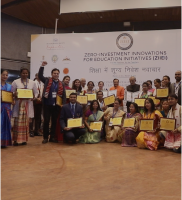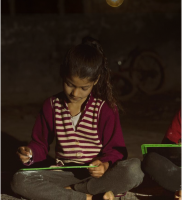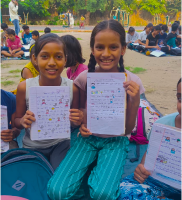Rethinking Education in the Students’ Context
The National Achievement Survey (NAS) 2021 revealed that students’ learning in higher classes is compromised due to weak foundational literacy and numeracy (FLN) skills. The NEP 2020 targets FLN proficiency by Grade III for every child. So, why are our schools falling short?
Challenges such as poor infrastructure, large class sizes, shortage of well-trained teachers, and curricula not aligned with literacy goals are significant, but there’s more to it. Effective FLN development requires a classroom environment where literacy and numeracy are not just subjects to be learned but tools to be used. Our Project-Based Learning (PBL) program is designed to achieve that in grades I to V.
Our Reach
States and UTs
FLN project booklets submitted by students
Our Approach
Moving beyond traditional academic instruction, our PBL framework offers an innovative project-based learning framework that encourages engagement and relevance. It integrates real-world problems into a structured curriculum, progressively introducing complex and collaborative projects. This approach allows students to build their skills systematically while continuous assessment and feedback ensure that learning gaps are quickly identified and addressed. By fostering higher-order thinking, 21st-century skills, and self-assessment capabilities, the PBL framework promotes a deep, contextual understanding of foundational concepts.
Program Components:
Structured curriculum implementation
Online orientation of teachers, equips them with the necessary skills and knowledge to implement PBL effectively. Following this, teachers receive a series of activity-based booklets that serve as the primary teaching material. These booklets are distributed progressively over four years, starting with three booklets in the first year and increasing to nine by the fourth year.
Resource distribution and support
Teachers receive comprehensive resources and reference materials to support the delivery of the PBL curriculum. We offer ongoing support to ensure that teachers can effectively manage the PBL activities and troubleshoot any issues that arise during implementation.
Execution in classrooms
Teachers implement the PBL activities in their classrooms, engaging students in projects that require them to apply their literacy and numeracy skills in practical, real-world contexts.
This hands-on learning approach helps students understand the relevance and application of the concepts they are learning.
Our Reach and Impact
Our methodology not only shows visible and tangible improvements in the learning outcomes but also helps learners to integrate their learnings with their environment and surroundings.
125 Projects
(25 projects each for Grade 1–5) created and launched in 22 States and Union Territories across India.
50 Lakh
Project based learning booklets received from students and schools across India.









